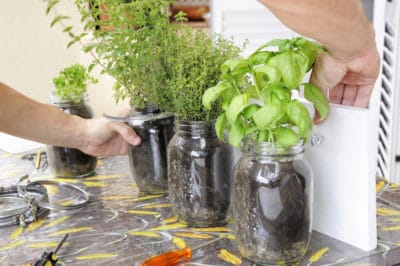Fragrant potpourri next to the sun lounger
However, there is still a good reason to have a potted garden on a sunlit terrace: the numerous scents and aromas always come directly to the nose. Some herbs even have very special advantages. For example, scented geraniums reliably keep mosquitoes away. Further ideas for the herb garden on the terrace: group different, intensely scented Mediterranean herbs (such as sage, lavender, hyssop, and mountain savory) around the seating areas and enjoy the scent of summer, sun, and sea. To make the best use of the limited space, place traffic lights with hanging herbs, such as hanging rosemary, savory, some types of oregano and thyme, and nasturtium.
cultivate herbs in pots
First, you should ensure that the potted herbs on your terrace have the light and location conditions that they also need when outdoors. Most types prefer a sunny location so that they can develop their aromas completely. However, there are some herbs that also feel comfortable in shaded places. Do not simply plant your herbs in any container because of an excellent design tool: clay and terracotta not only underline a Mediterranean flair very well, but also let a lot of water evaporate and are not always frost-hardy. Glazed ceramic pots with Asian motifs, on the other hand, go well with a Far Eastern style and corresponding spice plants. The glaze reduces the loss of water. Many other herbs can also be cultivated in rustic wooden troughs or pasture baskets lined with foil. These are winter-proof, but they weather with time. Heavy stone troughs are also very suitable for a terrace.
Cultivate potted herbs correctly
Whichever planters you choose: due to the limited amount of substrate, the plants cannot supply themselves and are therefore dependent on careful care. Water and fertilize the herbs according to their type and make sure that excess water can always drain off through drainage holes in the bottom of the pot.
Hint
even hardy herbs need winter protection if they are cultivated in a pot. Otherwise, the soil freezes through too quickly, and the plant dies.
